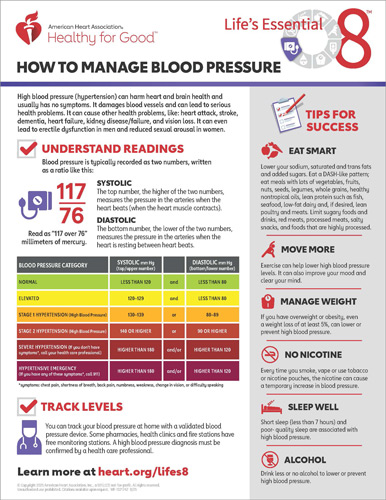Life’s Essential 8™ - How to Manage Blood Pressure Fact Sheet
High blood pressure (hypertension) can harm heart and brain health and usually has no symptoms. It damages blood vessels and can lead to serious health problems. It can cause other health problems, like: heart attack, stroke, dementia, heart failure, kidney disease/failure, and vision loss. It can even lead to erectile dysfunction in men and reduced sexual arousal in women.
Understand Readings
Blood pressure is typically recorded as two numbers, written as a ratio like this:
117/76. Read as “117 over 76” millimeters of mercury.
- Systolic: The top number, the higher of the two numbers, measures the pressure in the arteries when the heart beats (when the heart muscle contracts).
- Diastolic: The bottom number, the lower of the two numbers, measures the pressure in the arteries when the heart is resting between heart beats.
Blood Pressure Categories
- Normal: systolic lower than 120 mm Hg (upper number) and diastolic lower than 80 mm Hg (lower number)
- Elevated Blood Pressure: systolic 120 to 129 mm Hg (upper number) and diastolic 80 mm Hg (lower number)
- Stage 1 Hypertension (High Blood Pressure): systolic 130 to 139 mm Hg (upper number) or diastolic 80 to 89 mm Hg (lower number)
- Stage 2 Hypertension (High Blood Pressure): systolic 140 or higher mm Hg (upper number) or diastolic 90 or higher mm Hg (lower number)
- Severe Hypertension (If you don’t have symptoms*, call your health care professional.): systolic higher than 180 mm Hg (upper number) and/or diastolic higher than 120 mm Hg (lower number)
- Hypertensive Emergency (If you have any of these symptoms*, call 911.): systolic higher than 180 mm Hg (upper number) and/or diastolic higher than 120 mm Hg (lower number)
*symptoms: chest pain, shortness of breath, back pain, numbness, weakness, change in vision, or difficulty speaking
Track Levels
You can track your blood pressure at home with a validated blood pressure device. Some pharmacies, health clinics and fire stations have free monitoring stations. A high blood pressure diagnosis must be confirmed by a health care professional.
Tips for Success
- Eat Smart: Lower your sodium, saturated and trans fats and added sugars. Eat a DASH-like pattern; eat meals with lots of vegetables, fruits, nuts, seeds, legumes, whole grains, healthy nontropical oils, lean protein such as fish, seafood, low-fat dairy and, if desired, lean poultry and meats. vegetables, fruits, . Limit sugary foods and drinks, red meats, processed meats, salty snacks, and foods that are highly processed.
- Move More: Exercise can help lower high blood pressure levels. It can also improve your mood and clear your mind.
- Manage Weight: If you’re overweight, even a slight weight loss can reduce high blood pressure.
- No Nicotine: Every time you smoke, vape or use tobacco or nicotine pouches, the nicotine can cause a temporary increase in blood pressure.
- Sleep Well: Short sleep (less than 7 hours) and poor-quality sleep are associated with high blood pressure.
- Alcohol: drink less or no alcohol to lower or prevent high blood pressure

View or Download Fact Sheet
How to Manage Blood Pressure (PDF)
This fact sheet is also available in the following languages:
- How to Manage Blood Pressure - Arabic (PDF)
- How to Manage Blood Pressure - Chinese Simplified (PDF)
- How to Manage Blood Pressure - Chinese Traditional (PDF)
- How to Manage Blood Pressure - Haitian Creole (PDF)
- How to Manage Blood Pressure - Hindi (PDF)
- How to Manage Blood Pressure - Korean (PDF)
- How to Manage Blood Pressure - Russian (PDF)
- How to Manage Blood Pressure - Spanish (PDF)
- How to Manage Blood Pressure - Tagalog (PDF)
- How to Manage Blood Pressure - Vietnamese (PDF)
How to Manage Blood Pressure Resources
Life's Essential 8 Fact Sheets
- Life’s Essential 8 - How to Eat Better Fact Sheet
- Life's Essential 8 - How to Be More Active Fact Sheet
- Life's Essential 8 - How to Quit Tobacco and Nicotine Products Fact Sheet
- Life's Essential 8 - How to Get Healthy Sleep Fact Sheet
- Life's Essential 8 - How to Keep a Healthy Weight Fact Sheet
- Life's Essential 8 - How to Control Cholesterol Fact Sheet
- Life’s Essential 8 - How to Manage Blood Sugar Fact Sheet
- Life’s Essential 8 - How to Manage Blood Pressure Fact Sheet



